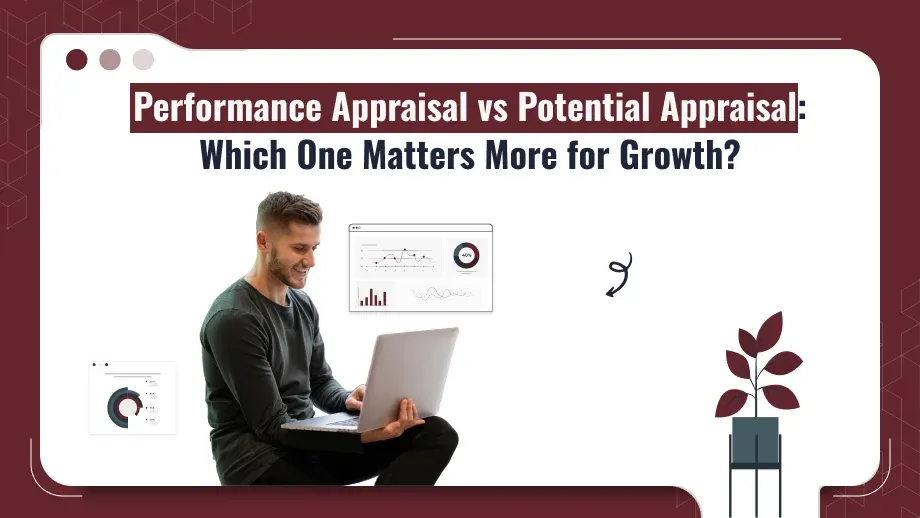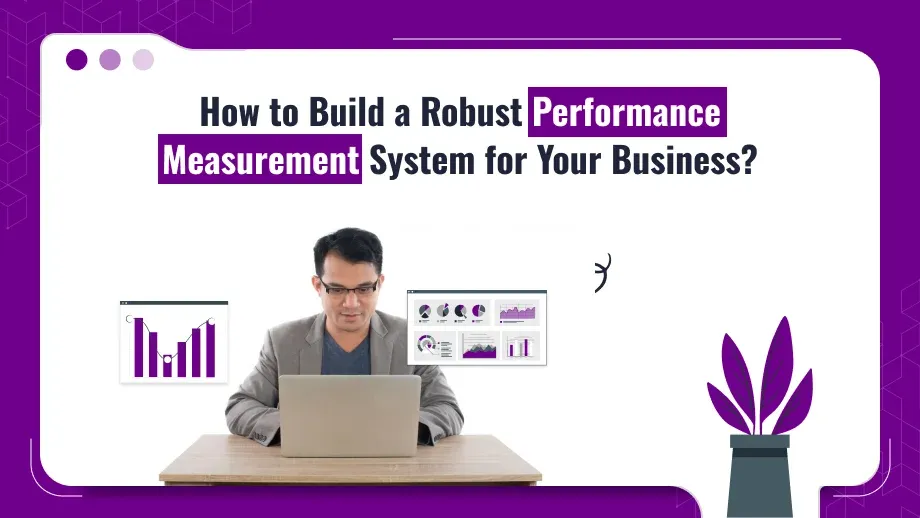
Both are used in organizations to measure the contributions and capabilities of their employees. The performance appraisal of an employee usually measures their current job effectiveness, while potential appraisal evaluates the employee’s capabilities for future roles. The two play complementary roles in Human Resource Management since both have direct implications on short-term productivity and long-term success. This blog will compare Performance Appraisal vs Potential Appraisal into the differences, benefits, and impacts of each type of appraisal, thereby giving readers a guide on how to leverage them both in maximum growth.
What Is the Definition of Performance Appraisal?
An appraiser evaluates an employee’s work performance appraisal over a predetermined time period through a formal procedure called performance evaluation, which is often carried out yearly or semi-annually. It is an evaluation of whether a worker is doing his duties, supporting team objectives, and adhering to company policies. Employees receive instant feedback from assessments that may be used to enhance their performance since they are centered on the present.
What Are the Main Goals of Performance Appraisal?
The main goals of performance appraisal include:
Structured Feedback: It offers employees constructive, precise feedback that enables them to alter their behaviors, enhance performance, and also develop competencies required in their professional lives.
Alignment of Goals: It ensures that every individual’s objectives are aligned to the team as well as the organization’s objectives.
Reward and Recognition of Contributions: It guides promotion decisions, salary or wage raises, or bonus considerations.
Popular Practices Used in Appraisals
Organizations adopt other techniques about how they want to handle the performance appraisal, according to their goals and corporate culture.
- 360-Degree Feedback: In this process, the supervisor, peer, and subordinate opinions of an employee are gathered in addition to some inputs from clients to give a holistic view of the performance of the employee.
- Self-Assessment: Here, the employees appraise themselves. Generally, it is compared with the manager’s evaluation so that the gaps in self-perception are assessed.
- Rating Scales: This approach is formal and quantitative where it is used by asking the employees to grade themselves on various competencies such as teamwork, productivity, and communication skills.
Many organizations employ payroll software in addition to HRMS & payroll software to provide this process. The types of software mentioned above automate performance tracking thus enabling the managers to easily measure the employee contributions.
Role in HR Performance Management
Performance appraisals are the heart of HR Performance Management. A formal feedback mechanism, performance appraisals guide an individual to identify his strengths and weakness areas. The setting of clear goals and measuring progress enable managers to align employee performance with organizational standards and objectives.
What is Potential Appraisal?
Whereas performance appraisal focuses on the past, potential appraisal looks at the future. It reviews an employee’s potential to grow within the organization. Potential appraisals aim at predicting an employee’s future capacity to take up more responsibilities and contribute at a level beyond his or her current role. For companies, identifying high-potential employees is essential for well-informed succession planning and leadership development decisions.
Objectives of Potential Appraisal
The key objectives of potential appraisal include:
- Identifying Future Leaders: Those employees who show leadership potential for higher levels of work or jobs.
- Support of Career Development: Specific training and development programs offered to the employees to help them gain new skills for future roles.
- Succession Planning: The organization ensures that it has a ready group of employees who are prepared and able to fill critical roles when necessary.
Common Methods in Potential Appraisal
There are quite a few common methods that are used in potential appraisals:
Personality assessments-aptitude and psychometric tests to assess traits like adaptability, problem-solving, and leadership which will be required in the future roles.
Assessment centers-Employees would be subjected to different simulation exercises that represent actual work challenges on the job which may transcend what they have done up to now in their assigned role.
Skill and competency analysis-checking if an individual has the ability to deal with the skills needed for the higher roles and finding the gaps that require knowledge or practical experience.
In Human Resource Performance strategies, it is the potential appraisals that play a very prominent role. These can be used to develop focused career development and training programs to provide growth for long periods in high-potential employees.
Empower your team’s growth – explore the performance appraisal vs potential appraisal today!
Discover how each assessment can fuel growth and talent development!
Role of Performance and potential appraisals in HRM
Performance and potential appraisals are part and parcel of Human Resource Management (HRM). While a performance appraisal examines the immediate contribution, it gives an idea regarding future capabilities. When both are used together, the HR team gets a complete view of each employee and can manage talent and strategize better.
Benefits of Using Performance and Potential Appraisals Together
- Balanced Talent Development: HR will be ensuring attainment of both short- and long-term results for the employees through assessment of current performance and future growth.
- Strategic Succession Planning: A focused succession planning activity places the organization in a great position in addressing the need for transitions, especially to different levels of leadership.
- Improved Retention: Selecting top performers and future leaders promotes an environment of growth, leading to turnover decline and increased employee morale.
With Team Performance Management, the HR teams can now monitor performance and potential appraisals. This helps to empower management with the right tools for strategic HR decisions that affect business results.
Difference Between Performance Appraisal vs Potential Appraisal
While Performance Appraisal vs Potential Appraisal do have a similar name, they are actually built quite very differently in many respects:
- Focus: The performance appraisal looks at employees’ present effectiveness to their jobs; whereas, the potential appraisal evaluates if the employee has the capability of handling and delivering future responsibilities.
- Time Horizon: Since the performance appraisals revolve around evaluating past-year achievements and progress. Potential appraisal, on the other hand, focuses on the long-term horizon because it looks at growth over a few years.
- Objective: Goal of Performance Appraisal is designed to allow immediate improvement in performance. On the other hand, potential appraisal aims at development about a career and succession planning.
- Outcome: Performance appraisal is very likely to trigger immediate rewards including promotion, salary adjustment, or bonus. Performance Appraisal vs Potential Appraisal leads to development plans, mentoring, or additional training for an employee so that he is ready for future assignments.
Understanding these two types of appraisals will help HR teams apply each type of appraisal effectively towards realizing the full growth of employees and hence, the ultimate objectives of the company.
Why Appraisals Both Are Essential for Growth?
Having performance and potential appraisals brings individual benefits, whereas together they form development of growth-focused workplace culture. Here’s how each appraisal type contributes to the growth of employees.
Why Performance Appraisals Matter
Performance appraisals make the employees better at improving the performance of jobs that yield;
- Increased Productivity: Channeled feedback helps them uncover improvement areas. Eventually, this translates into increased productivity.
- Esteeming efforts: the high performers are positively rewarded with aspects like pay increases or promotion, which boost motivation and satisfaction in employment.
- Accountability: General performance reviews make employees responsible for attaining their objectives and making a contribution to the achievement of team goals.
Performance appraisal is one of the keystones of HR Performance Management. In return for clear expectations and actionable feedback from the company, this can increase the overall productivity with focus on aligned organizational objectives.
Why Potential Appraisals Are Important
Potential appraisals prepare employees for future growth, offering several key benefits:
They identify future leaders who can fill essential roles in an organization as it grows.
They prepare employees for future roles in the company through potential appraisal and help meet their career development.
Succession planning helps to build an effective leadership pipeline. Ensuring continuity in key roles helps the organization grow by stability.
Appraisals play an essential role in long-term Human Resource Performance strategies, as it allows them to build a good-quality workforce that is molding with the organization.
Use of Payroll Software and HRMS for Appraisals
Most of the companies use the payroll software and HRMS & payroll software that may help to simplify and automate the employee appraisal process. Especially, it makes it possible to track performance and potential appraisal data, and therefore, it will make it easier for the HR teams to store records while also assisting in being able to track the progress over time.
Advantages of HRMS & Payroll Software for Appraisals
- Auto Performance Tracking: Goals, as well as the milestones in addition to other performance metrics, can be auto-tracked, thus saving more time and increasing accuracy.
- Centralized Data Management: All the appraisal records are kept in one system, so HR can easily access and analyze the data when required.
- Consistent Review Cycles: Application of HRMS tools will ensure that the appraisals are done within regular cycles, encouraging a culture of constant review.
These tools are very crucial to the performance management of the Human Resource department; they provide the HR teams with sharp views of employee performance and potential, which may inform future choices.
Combining Performance and Potential Appraisals
Including performance and potential appraisals in Team Performance Management frameworks will provide full employee development. Here is how both can be included in the differentiate between performance management and performance appraisal strategy development for growth in a company:
- Combine Short- and Long-Term Goals: Discuss present performance and long-term aspirations during the review session. This will enable the employee to concentrate on his role now while planning for his future within the organization.
- Clearly define the evaluation criteria : job-specific skills and actual goal accomplishment in a performance appraisal, but more general job competencies such as leadership or critical thinking capabilities in a potential appraisal.
- Regularly update appraisal processes: Companies’ goals change, so must their appraisal processes to ensure it remains effective for growth and development.
- Using performance and potential appraisals: HR teams set a growth-oriented work environment that measures present contributions but invests in future potential.
Which Counts More for Growth?
In the case of performance vs potential appraisal, there is always a marked and contrasting difference concerning the impact it brings to the employee and organizational growth:
Immediate Impact on Growth: Performance Appraisals
Growth helps through the performance appraisal system with timely comments, acknowledgment, and decisions with regard to rewarding. They make workers try for high standards and contribute toward team goals, hence a quick impact on the productivity and morale of the workplace.
Long Term Impact of Growth: Future Appraisals
Potential appraisals of needs are possible through sustainable development. They let companies identify who among the employees can assume the leadership. This manner allows organizations to develop their high-potential employees with more substantial responsibilities that will maintain stability and continuity in their succession plan.
Using HRMS & payroll software for such processes brings the organizations to the balance between short-term and long-term growth needs. The difference between performance appraisal and potential appraisal, the same through various tools, prepares the HR team to prepare for the future while rewarding current success based on performance and potential data in one place.
Conclusion
In gist, performance and potential appraisals form part of the important steps in an employee’s journey towards growth, as well as that of an organization. The performance appraisal management system focuses on the present job, enhancing employees’ contribution in their daily work. Performance Appraisal vs Potential Appraisal looks forward to helping to analyze whether an employee is geared up to take on future roles and, thus, assists the creation of a road map for career development. Companies use both methods to drive this growth culture into alignment with the goals of the organization.
With payroll software and HRMS & payroll software, the appraisal processes can be streamlined within HR teams. It maintains reliable records of all the employees with efficient tracking of every employee’s journey. Thus, the organizations can have an all-balanced approach and meet immediate needs for productivity in this manner while gearing up for future challenges and growth.






